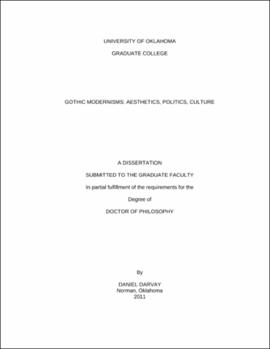Gothic Modernisms: Aesthetics, Politics, Culture
Abstract
I analyze the persistence of Gothic conventions in the works of four major British modernist writers: Joseph Conrad, E. M. Forster, Virginia Woolf, and D. H Lawrence. These writers depict cultural, political, and aesthetic dimensions of modernism not only by questioning the past but by drawing as well on a wealth of cultural material and precursor genres rooted in Gothic conventions. The picture of modernism suggested by these authors presents multiple perspectives on thematically disparate yet culturally intertwined issues such as ethnicity and espionage, consciousness and electricity, formalism and sensation, and homosexuality and tourism. These sets of issues constellate the central argument for the four main chapters of my dissertation. Each set illustrates the double-faced nature of Gothic modernism--that is, its simultaneous attention to social renewal and cultural nostalgia. I argue that, faced with the xenophobic milieu of pre-War English society, Conrad seeks to refashion his ethnic Polish identity by adopting the Gothic logic of the fin-de-siècle British spy novel. I show that Lawrence employs a Gothic tropology of electricity in his modernist notion of blood consciousness. Woolf's theory and practice of the novel extends crucial elements of the Gothic sublime shared by earlier sensation fiction and by nineteenth-century psychiatric methods of diagnosis. Finally, I argue that Forster recasts modern English society by symbolically purifying it from homophobia through the image of Italy as both a Gothic dungeon and a tourist attraction.
Collections
- OU - Dissertations [9477]
Related items
Showing items related by title, author, creator and subject.
-
Literary transculturation in Latino United States of America: An analysis of language in the works of Tato Laviera and Robert G. Fernandez.
Alvarez, Stephanie M. (2006)This dissertation studies the theory of transculturation and its application to the study of U.S. Latino literature. Specifically, I analyze Spanglish as a form of linguistic transculturation in the poetry of Tato Laviera ... -
Whose desires are they? The politics of subversion in works by E. M. Forster, Nathalie Sarraute, and Jean Rhys.
Caruso, Katharine H. (2006)This dissertation examines the ways in which we read representations of the feminine subject in works that have been deemed complicit in strengthening hierarchies of gender and/or race. Building upon feminist critics' ... -
Holy terror: The vampire as numinous experience in British and American literature.
Mcdonald, Beth E. (2000)This dissertation investigates the experience of the numinous in a specific category of Gothic literature, which employs a vampire as the primary focus of its action, regardless of whether that figure is literal or metaphoric. ...
